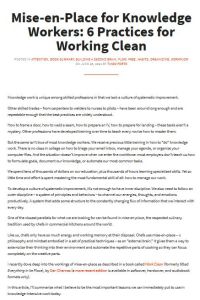Join getAbstract to access the summary!

Join getAbstract to access the summary!
Tiago Forte
Mise-en-Place for Knowledge Workers
6 Practices for Working Clean
Forte Labs, 2021
What's inside?
Borrow key principles from French culinary philosophy to improve your productivity.
Recommendation
Restaurant kitchens were once messy, chaotic, disorganized places. In 1859, a 13-year-old boy named Georges Auguste Escoffier revolutionized how kitchens operate by introducing a philosophy called mise en place. His method streamlined culinary work and is now the gold standard for kitchens worldwide. Productivity expert Tiago Forte argues that knowledge work must undergo a similar transformation. By infusing your work with a dollop of mise-en-place principles, you can reap palatable productivity gains.
Summary
About the Author
Tiago Forte is the founder of Forte Labs, a San Francisco-based consultancy for improving productivity.

















Comment on this summary